LOCKDOWN REFLECTIONS: DAY 42
Out in the field and at home, reality bites
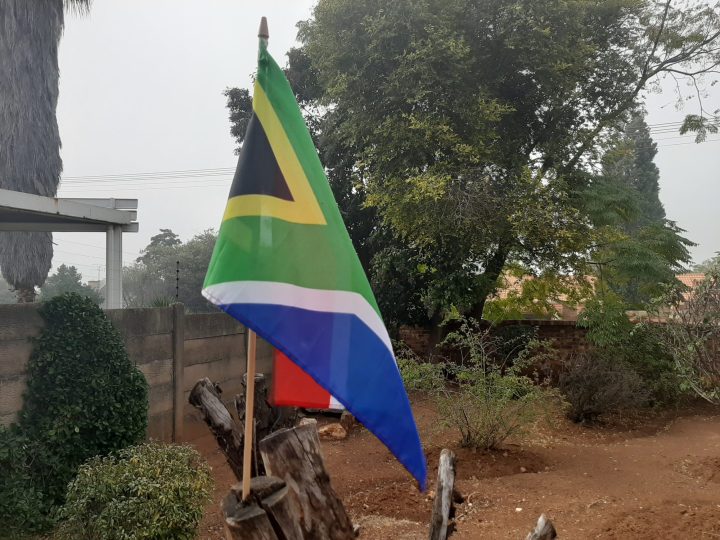
South Africa went into a 21-day lockdown on Friday 27 March in the hope of blocking the spread of Covid-19. The lockdown was extended for two weeks, then Level 4 kicked in a week ago. These reflections are part of a series by Young Maverick writers monitoring stay-at-home life in various neighbourhoods.
See Pre-Lockdown Reflections here; Day 1 here; Day 7; Day 14; Day 21 and Day 28 here, day 35 here
Is this set-up a house of cards, ready to collapse at any moment
Johannesburg South, Gauteng – Did we plant the seed of the so-called Rainbow Nation in barren soil? That’s the question that’s played on my mind over the last seven days. Is this all just a sham – this happy-go-lucky democracy of ours?
One question I’ve always asked myself as someone born just a couple of years before we ushered in a new era in South Africa’s history is how white people who grew up during apartheid, and were told by that system that they were superior to other races, could miraculously just cast aside that propaganda injected mentality for the sake of our first “new dawn?”
The other question I’ve always asked myself is how black people, who had viewed white people as enemies throughout the 48 years of apartheid, could just shake off that resentment and happily skip as the sun rose, bringing forth a supposed new dawn? Especially when it felt like the gatekeepers of apartheid had escaped with a slap on the wrist for murder?
These are questions that play on my mind as a youth trying to navigate this new South Africa. They eat away at me. Is this whole set-up we have here just smoke and mirrors, just a house of cards, ready to collapse at any moment?
This, of course, is not to say all white people in South Africa hate black people, and vice versa.
However, I think the arrival of Covid-19 and subsequent frustration from the lockdown has exposed the fact some white people in South Africa still view themselves as superior. And inversely, some black people still view white people as the enemy. Certainly, if the news reports I encounter every day, as well the hate spewed on obscure social media groups are anything to go by.
How long until the hate disguised as freedom of speech on social media plays itself out in the real world? – Yanga Sibembe
Over the fence, people who didn’t receive aid were looking on

Observing the scale of need in the townships was sobering. Gift of the Givers handed out a total of 700 parcels in Langa, Nyanga and Crossroads on 6 May 2020. (Photo: Sandisiwe Shoba)
Rondebosch, Cape Town: Being out in the field for the first time since lockdown started was exhilarating. I tagged along with Gift of the Givers on Wednesday as they dropped off food parcels to the elderly in Nyanga, Crossroads and Langa. It was a welcome change from the monotony of the new normal. Although the streets liven up between 6am and 9am as people exercise, the suburbs are still largely quiet.
This is in stark contrast to the townships. It’s as if lockdown doesn’t exist there. I saw people milling about on the streets, children playing outdoors and very few masks being worn. Groups of men huddled together on street corners, playing cards, with some drinking quarts of beer.
It’s concerning, to say the least, but it’s not an indictment on the townships. Sitting at home, watching Netflix and baking three-cheese lasagne for Instagram is a luxury reserved for the few. Poverty and hunger are rife and people feel forced to get up and hustle for a meal. It doesn’t help that there’s still this idea floating around that Covid-19 is a “white disease”.
But observing the scale of need in the areas we went to was sobering. A total of 700 food parcels were delivered and another 1,250 will be handed out to learners in Nomzamo on Thursday. That’s a lot of food, but it’s still only helping a small portion of the millions struggling through this season.
On Wednesday as the elderly were handed their food packs, some ululated and started dancing with joy, but over the fence were scores of people looking on who didn’t receive aid. The envy and pained looks on their faces was almost too much to bear. It’s a reminder of how crucial it is to give at this time. More than that, it’s proof of how stark the inequalities in our country are. – By Sandisiwe Shoba
My mom’s Freedom Day is not the same as that of an Emmarentia jogger
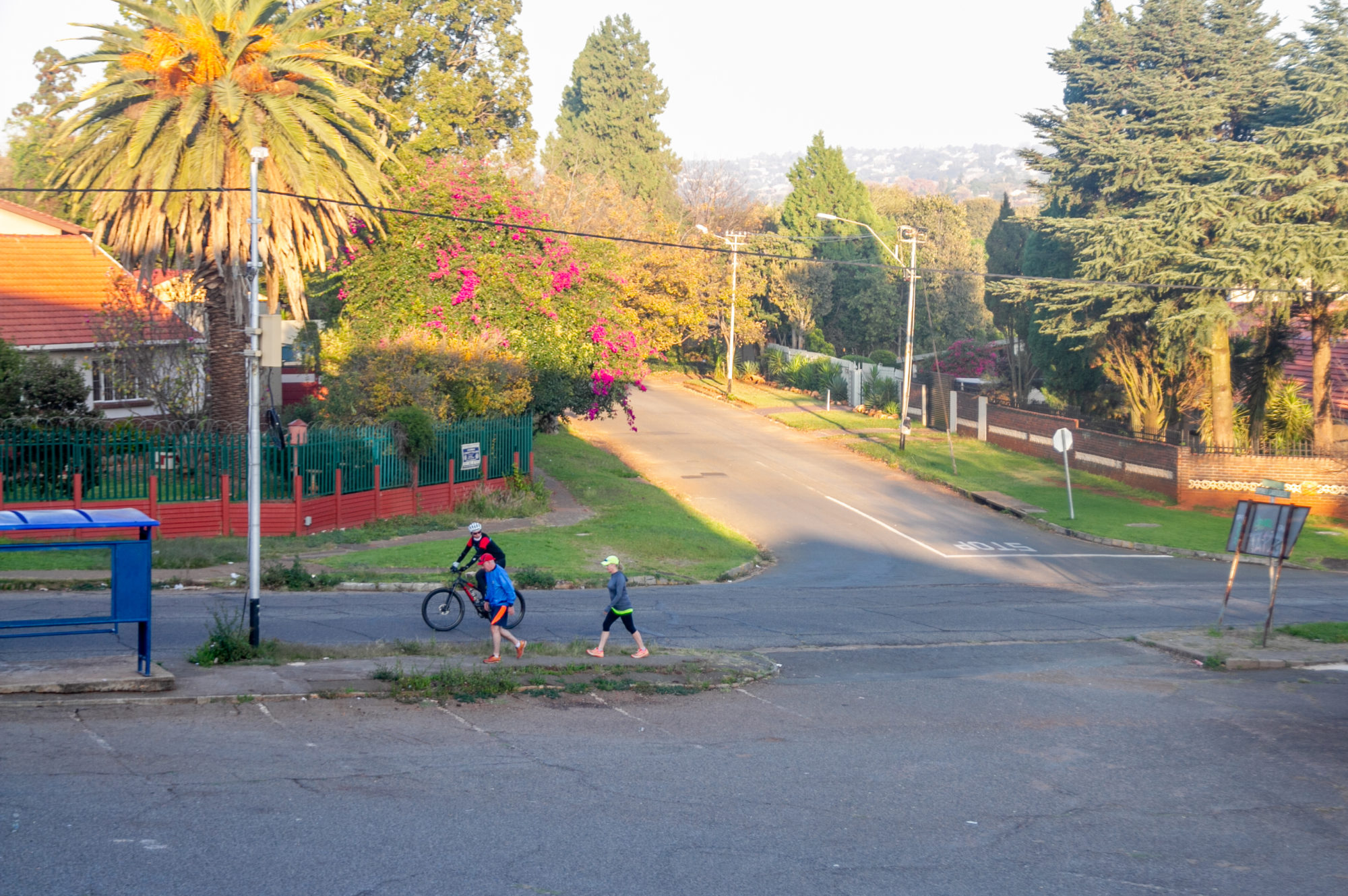
Residents enjoy the freedom to jog during level 4 of the national lockdown on 7 May 2020 in Emmarentia. (Photo: Sumeya Gasa)
Emmarentia: The first Thursday of Level 4 is markedly busier than the previous Thursday. There are cyclists, joggers and dog walkers on the road. Today, however, is no comparison for Day 1 of Level 4.
Watching from my balcony on 1 May, I witnessed hordes of joggers and dog walkers come out to enjoy the easing of restrictions. It was unfortunate to note that there was little physical distancing. Even more disturbing was seeing a cycling club with one cyclist carrying a baby (or a tiny toddler) on a ride-along bike seat. This day was compared to Freedom Day by a fellow Emmarentia Resident who spoke to News24.
I wondered how the comparison would sit with someone like my mother. A mirthless chuckle later, I called my mom and asked her for her account of her first Freedom Day.
“It was our first time voting and we attended meetings leading up to election day where people who worked with the IEC told us what to expect on the ballot and what we needed to do to cast our vote. I voted ANC,” says my 60-year-old mother. She was 34 at the time and I was almost two years old.
“I remember how attentively I tuned into the counting of votes on Ukhozi FM – it was still called Radio Zulu at the time – and when the ANC victory was announced there was ululation, clanging pots and hooting cars,” she adds.
Later that day, her family got together for a celebratory braai. At the time, my mom says she lived in an informal settlement in Durban with my older brother and me. Her shack was a patchwork quilt of wood, cardboard and a lot of plastic, she recalls.
“I was very excited because I knew we were finally going to apply for RDP housing.”
She applied and the house never materialised.
“Level 4 is nothing like Freedom Day because we are still stuck with a virus that has no cure yet. So that comment really hurt because Freedom Day for me was a day that made me hopeful, but nothing has changed and that is a gaping wound for me,” she says.
My mother was an ANC supporter for a long time. But in 2014, she gave up her lifelong hope for change through the ANC. For her, voting these days is a mixture of duty and fear of the country falling back into the hands of the architects of apartheid. – Sumeya Gasa
We could be nation-building, but we resort to bickering
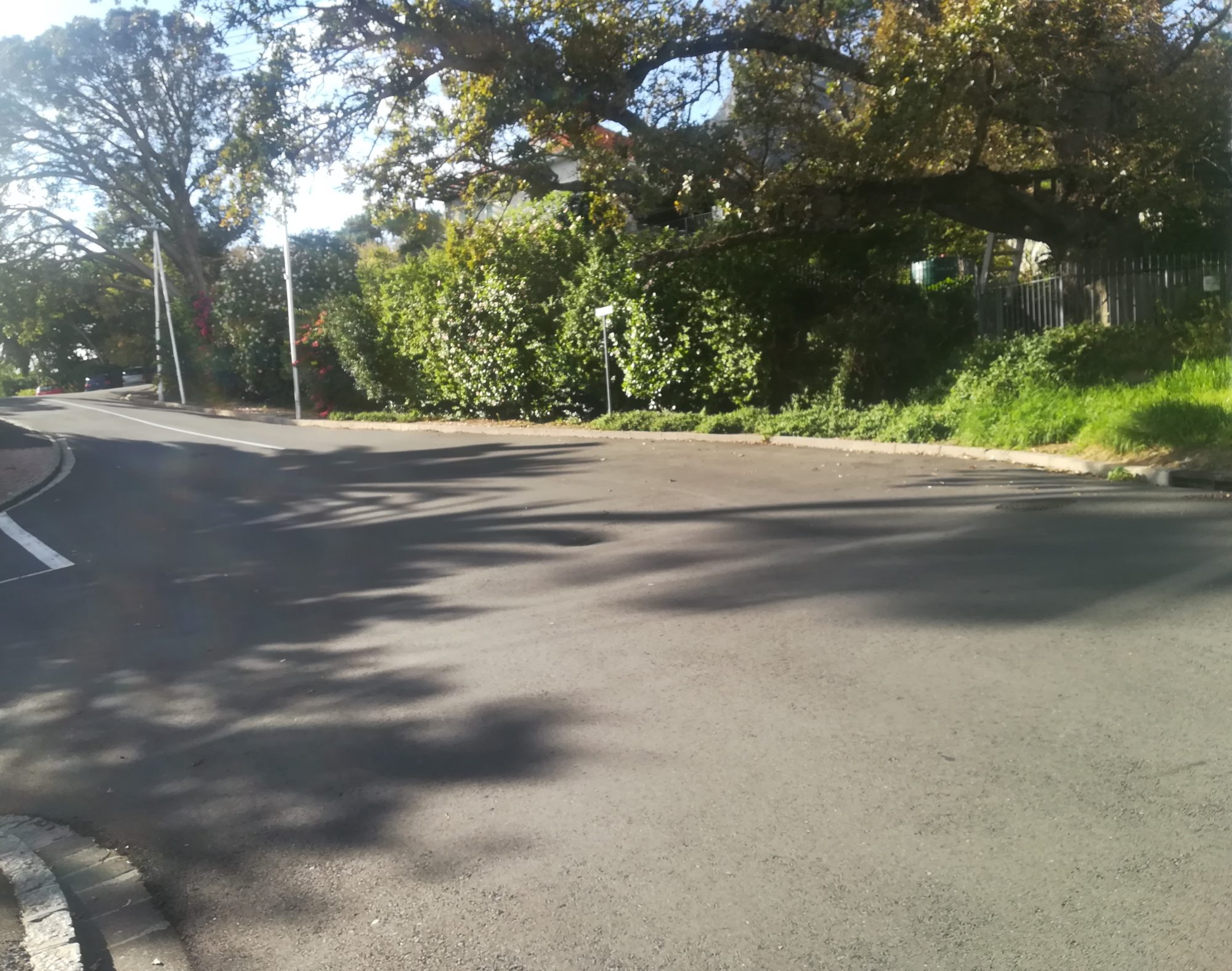
A deserted street in Oranjezicht, Cape Town. (Photo: Suné Payne)
Oranjezicht, Cape Town. I feel sorry for the tiny squirrels and the guineafowl that have become accustomed to the silence of the humans. They would roam freely in streets beneath Table Mountain, without any cause for concern during the lockdown – it must have been heaven.
Until lockdown regulations were lifted slightly to allow for exercise. Then the giant humans came back into their space through the loud stomps and huffing of runners trying to get in their adrenaline rush before 9am. My area is ideal to run in – flat, uphill and downhill surfaces combined with white picket fences and glorious trees and many people use the space to run, jog and walk – but it’s strange hearing people and their dogs come past in the morning. It’s strange to hear others’ laughter and the loud conversations they have as they run/ walk past my house.
Once the regulations were eased it was not only nature that was disturbed, I was disturbed too. Can an announcement over cigarettes cause this much enhanced racial tones towards one person, the easy target because of her history? The past week has really tired me out, from blaming Nkosazana Dlamini Zuma for a decision the whole National Command Council took together to the “silent protest” by surfers. To be honest, the race-baiting and blatant sexism has brought me down this week. Surfing through social media, where ordinary people, those in political parties and senior journalists themselves made comments that made me want to weep for this country. How can a senior, respected journalist compare this country to the Taliban?
As a country, we could have had honest and nation-building conversations about race, class and inequality, but no, we chose to channel our energy into petty, emotionally driven fights over cigarettes. Where is this energy for the curfew? Where is this energy for equity in schools? Where is this energy for police brutality against black people?
Another day in South Africa, another missed chance to bring us together in all the glory of our ugly, unequal and brilliant parts. – Sune Payne
I’m focusing on the things I’m grateful for

The closure of a number of magazines has made me feel deeply grateful that I still have a job. (Photo: Karabo Mafolo)
Mowbray, Cape Town: With all the job losses in the print media industry in the past week, first Associated Media Publishing then Caxton, I’ve been left feeling deeply grateful that I still have a job.
I grew up reading magazines and I still occasionally buy one. To be honest, the main reason I’ll buy a magazine is if the cover is aesthetically pleasing or if there’s an interesting article I’d like to read, but wherever I am, if there’s a magazine, I’ll read it.
It’s sad to think that the magazines I read throughout my teenagehood and my early 20s won’t be around in a year or two. Magazines were where I went to read about celebrity gossip, in-depth interviews with people I watched on soapies and in music videos and to catch up on the latest fashion and beauty trends. It’s where I got all the sex and relationship advice I was too scared to ask my parents for.
The lockdown means that many people have lost their jobs and according to this report many more people will lose their jobs, but it’s still scary to see magazines that have always been a part of my life disappear.
So in the midst of all the uncertainty, it feels like a huge blessing to be certain about one part of my life. So this week I’m focusing on the things I’m grateful for. – Karabo Mafolo
‘Our People’ is a pseudonym for ‘stuff you’
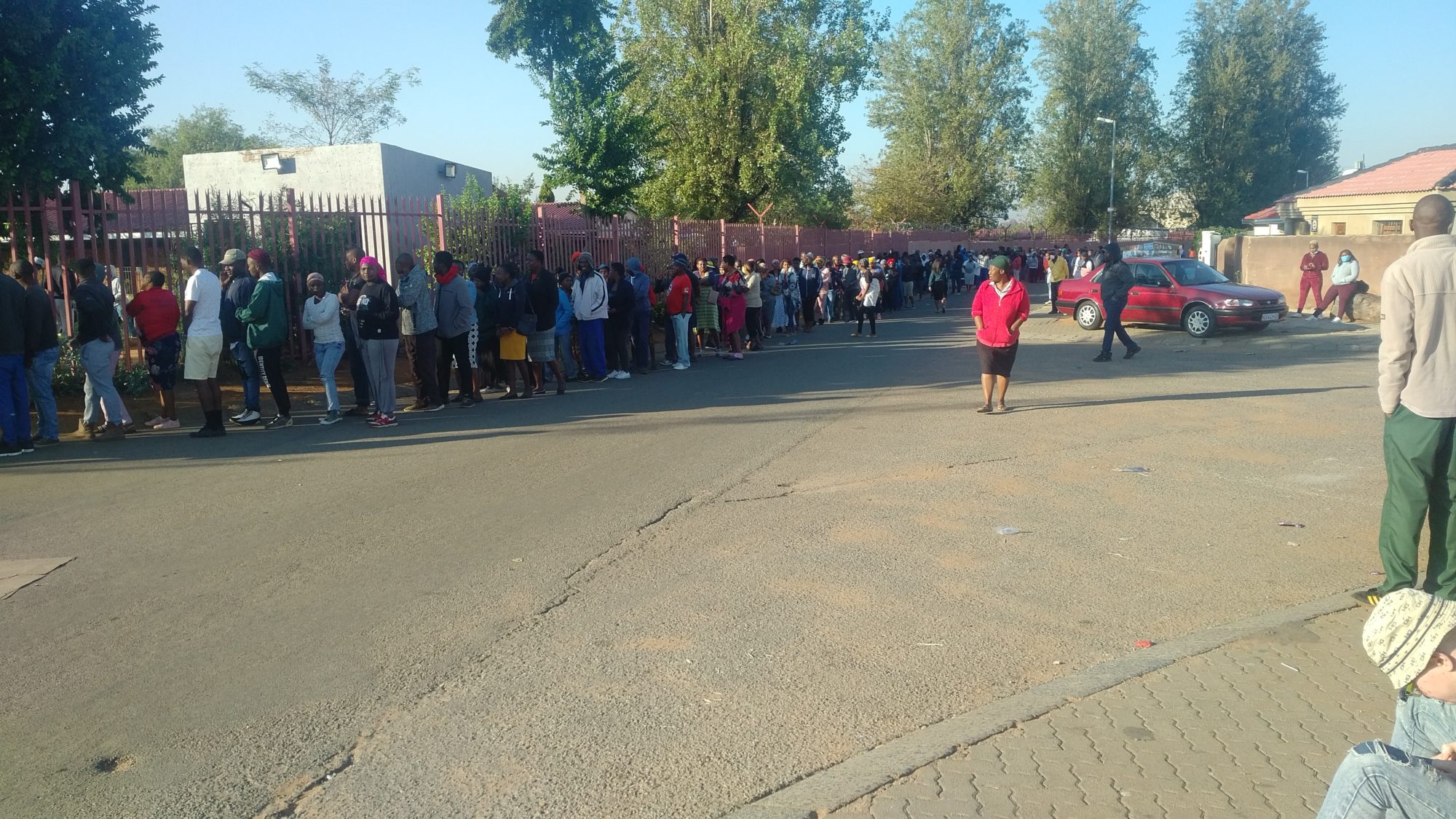
Chiawelo community members queue at the Vuwani Secondary school to register for food parcel relief on 23 April 2020. (Photo: Bheki Simelane)
Protea, Soweto: How regrettable it is that even in such tumultuous times and period of great distress and need for many poor South Africans, corruption continues to thrive.
Throughout the country there have been complaints of food parcels not reaching beneficiaries. These are poor people to whom the little food would make a world of difference. The government had initially said that the food parcels would be delivered at people’s homes because making people queue for food at community centres would strip them of their dignity. People most in need of the food parcels such as the sick, elderly and poor people would gain first preference.
The nationwide uproar over the food parcels distribution tells a different story. Politicians were to be excluded from the process, but their fingerprints are all over the food meant for “Our People”.
“Our People” is a pseudonym for “stuff you”. Regrettably, many of those who have been swindled out of their food parcels do not seem to have a voice. The only hint of a sound is their stomach rumblings. This was to be expected with the unprecedented levels of corruption witnessed in the country.
On the one hand, those who steal food parcels do so aware that it’s food chiefly meant for poor people, and also that typically there will be no consequences. On the other hand, those who are tasked with overseeing the flawless distribution of the food parcels have not the slightest idea what is happening on the ground.
The idea that the devastation of Covid-19 should be shouldered in unison is an unattainable feat in our corruption-stricken society.
If food relief can fall victim to unscrupulous individuals or groups, how much more financial relief? Unless drastic immediate steps are taken to reach out to the most vulnerable, the coronavirus might have just hit the Jackpot in our country. – Bheki C. Simelane
Job losses and salary cuts are all around me
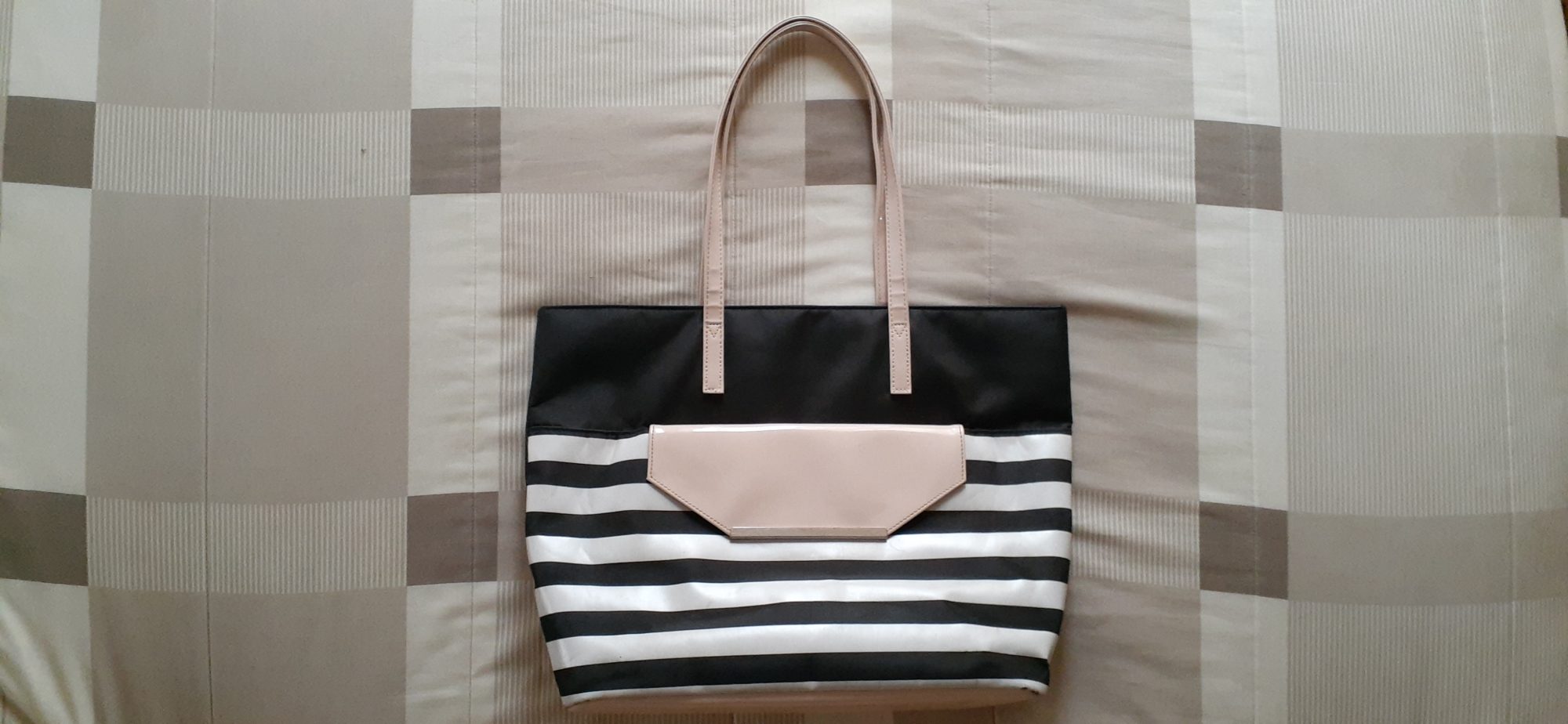
Image: A handbag sold to me by my friend. (Photo: Ayanda Mthethwa)
Ekurhuleni, Gauteng: Thursday marks 42 days since South Africa went into a nationwide lockdown. The only difference now is that it has been eased and moved to level 4, permitting some industries to reopen. Exercise is also permitted but under stringent conditions.
I have witnessed four job losses that have affected friends and family members. This coupled with hunger being experienced by many South African families, even the so-called “middle class”.
It has been widely reported that SA’s middle class is drowning in debt. A phone call I received from a friend three days ago opened my eyes to this reality.
My beloved friend shared how she had received a termination letter from work, and 45% of her salary. At that point, she was more worried about being unable to pay her accounts and loans than the thought of running out of food supplies. Let alone how she would survive the coming months.
She quickly reminds me that she is a “hustler”. She’s braided my hair before, manicured my nails, and sold me a few clothing accessories like bags, African print doeks and earrings. So maybe, just maybe she can hustle her way through.
But Facebook and Twitter are also teeming with people’s stories of how they have either lost their jobs or had to retrench staff because for business owners, paying salaries without no work is becoming a handful of a task.
Preliminary modelling from Business for South Africa previously estimated that there will be almost one million job losses due to coronavirus. But unlike my friend, not all of these people can manage a hustle. – Ayanda Mthethwa. DM


















 Become an Insider
Become an Insider